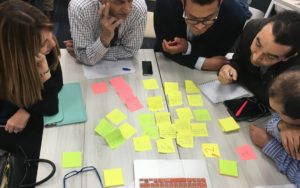RESOURCES
Big Idea: Kindness

Who doesn’t need a little more kindness? Developing a Challenge from the Big Idea of kindness provides an opportunity to explore concepts that transcend cultures and have philosophical, structural, personal, and practical components. The Big Idea of kindness allows for various depths of analysis and the creation of challenges by all ages of learners in all contexts.
Kindness seems simple, but an exploration of the interpretation and implementation of the concept allows for deep thinking and learning. The challenge “Demonstrate kindness!” provides an example of one broad direction to be explored under the Big Idea of kindness. Remember that the best challenges emerge from the learners, reflect their context, and allow for a wide range of possible solutions. So let’s think together how we can develop kinder lives, relationships, schools, communities, countries and challenge ourselves to do so.
ENGAGE
Big Idea: Kindness
Essential Question: How can we create kinder lives, relationships, communities, and schools?
Challenge: Demonstrate Kindness!
Sample Guiding Questions
These are only example questions we encourage you to ask as many personal and contextual questions as possible.
- What is kindness?
- Why is kindness important?
- What does kindness look like?
- What are the attributes of kind people?
- What is the relationship between kindness, ethics and values?
- Who are the kind people in your community?
- What is the goal of kindness?
- How is kindness demonstrated?
- Where does kindness come from?
- What if everyone was kinder?
- When is kindness counter-productive?
- Etc.
*Once you brainstorm all of the questions organize and prioritize them.
INVESTIGATE
Guiding Activities and Resources
These are only a set of example activities and resources and the learners will need to evaluate the quality of the content. They are not verified or necessarily supported, just examples. The ones that you choose should be in direct relationship to your specific guiding questions and context. Activities and resources for adults, adolescents, and younger children will be different. The goal is to develop solutions that mean something in your community and are sustainable.
Example Activities
- Explore the definition and origin of the term kindness.
- Research the idea of kindness across different cultures.
- Explore historical waves of kindness and movement (e.g. Pay it forward. The World Kindness Movement (WKM))
- Investigate organizations focused on kindness
- Explore the concept of kindness in literature.
- Investigate the psychology of kindness?
- Explore if the concept of kindness occurs across species.
- Identify people with the characteristics of kindness, interview them and create profiles
- Analyze examples where kindness can be misdirected and problematic.
- Etc.
Example Resources
- The Importance of Kindness
- Why Random Acts of Kindness Matter to Your Wellbeing
- The Random Acts of Kindness Foundation
- Kids for Peace
- The Web as random acts of kindness – Ted Talk
- Kindness in the Classroom
- Etc.
Synthesis
Using the research findings from your Investigations develop a synthesis that demonstrates a clear understanding of the challenge. For help with creating a synthesis explore this resource.
Solution Prototypes – Using your research synthesis create multiple ideas for solutions and review each one to make sure your research supports it. Share the prototypes with various stakeholders and get feedback.
Solution – with the feedback from the stakeholders develop one solution that has the most potential for success.
ACT
Implement – Develop a plan to implement the solution with the stakeholders and collect data about the impact.
Evaluate – Using quantitative and qualitative measures determine if the solution is valid and what can be improved.
REFLECT, DOCUMENT, AND SHARE
Throughout the experience take time to document the events and reflect on what is happening to build on prior knowledge and identify future questions.
Share what you learned with your local community and the world. Use #CBLWorld on social media.
